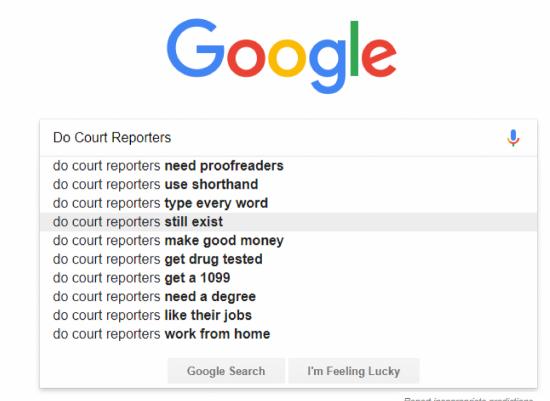
Yes, Court Reporters absolutely still exist. One of the oldest professions is still alive. However, with recent claims of artificial intelligence and various voice to text technologies taking root in the courtroom coupled with news stories of the severe lack of new court reporters joining the workforce, it's easy to see how you might think the profession has gone the way of the dinosaurs. As for now, the subtle intricacies required of a discerned ear are unmatched by AI and voice to text systems, meaning, court reporters exist and will continue to exist.
Furthermore, not only do court reporters still exist, the demand is higher than ever. With currently available court reporting jobs outpacing the number of available court reporters to fill those positions. As we discussed in a previous article, the demand for closed captioning is quickly outstripping the available workforce trained in stenography, reports the Hamilton County Herald.
One of the issues behind the deficit is a lack of educational awareness. Young people aren’t being introduced to the idea of this career path while they’re first considering which avenue to follow upon entering the workforce. You can read more about some of the effects the shortage is having on court reporter salaries here.
How Does Court Reporting Work?
Court reporting, stenography, and captioning all fall under the same skillset. With similar setups for each, the only difference is the location and subject matter. All court reporting jobs (stenography jobs) involve the verbatim transcribing of spoken language into text.
This involves a trained stenographer recording every spoken word in real-time through a machine called a stenotype. Through training and a lot of practice, the court reporter can keep up at the rate of normal speech utilizing a shorthand code.
Mark Kislingbury set the record for the fastest real-time court reporter back in 2004 when he transcribed 360 words in a minute with an accuracy of 97.23 percent having memorized over 100,000 chord combinations that make up the language of the courtroom.
How Do Court Reporters Type So Fast?
In order to reach these high speeds, a method called “chording” is implemented. Chording allows a stenographer to quickly break down words into their basic syllables and reconstruct them as a code of shorthand representing anything from a single utterance to a complex sentence expressing legal references, and case facts, with no lack of innuendo.
Classically, in the days following the proceeding, the court reporter takes the transcript and translates it into a readable text as the official court record.
A newer technology has emerged that allows for a much faster turnaround time between the rough draft of the transcript and the official record. Real-time court reporting ads a second stage to the live transcribing where the court reporter’s shorthand is translated live, on the spot.
Real-time court reporters are held to a higher standard of accuracy as their stenotypes are directly connected to a screen for others to view as the proceeding transpires. The internet age coupled with real-time court reporting has made it possible to live stream court reporters across the globe. No longer does a court reporter need to be in the same building, city, nor state as the witness they are deposing. This means real time court reporting jobs are a serious work-from-home opportunity.
Do U Need A Degree To Be A Court Reporter?
To become a court reporter, no degree is required. The flexibility and cost-effectiveness of a court reporting certification program makes stenography a viable option for those looking to avoid costly expenses of college, avoid having to re-educate through a degree program as an older student, and those looking for an accelerated path to a solid and lucrative career.
The skills you’ll acquire through a court reporting certification program transcend the courtroom. Stenographers can work in a variety of environments including but not limited to litigation, witness deposition, and corporate meetings and through to the world of televised entertainment.
National Court Reporters Association approved court reporting programs
What Can You Do With A Court Reporting Degree/Certification?
Working as a stenographer providing closed captioning for live events enables you to work in sports like the NFL and television broadcasts of shows for the hearing impaired. With a direct feed to the network, a closed captionist has the flexibility to work from anywhere he has an internet connection.
Captioning has become a lucrative career that includes the added bonus of helping others. Just stepping out of the courtroom a stenographer will find their services are needed in entertainment, education, and even more intimate events such as weddings and funerals whilst providing a flexibility to work on the road and from the comfort of one’s home office.
With internet enabled realtime streaming court reporting, a home-based stenographer has the ability to work on depositions anywhere in the country… or the world. It is possible to create a flexible and successful career as a Work From Home Stenographer.
Conclusion
Becoming a proficient stenographer is still a solid career choice. With opportunities to work freelance from home, work in various capacities within the legal system, entertainment, and private events can enable anyone with the skill to diversify his income and craft a varied and rewarding profession. As the job opportunities continue to outpace the stenography workforce, newcomers will find demand pushing wages higher and the power to pick and choose the jobs that best suit their professional goals.





